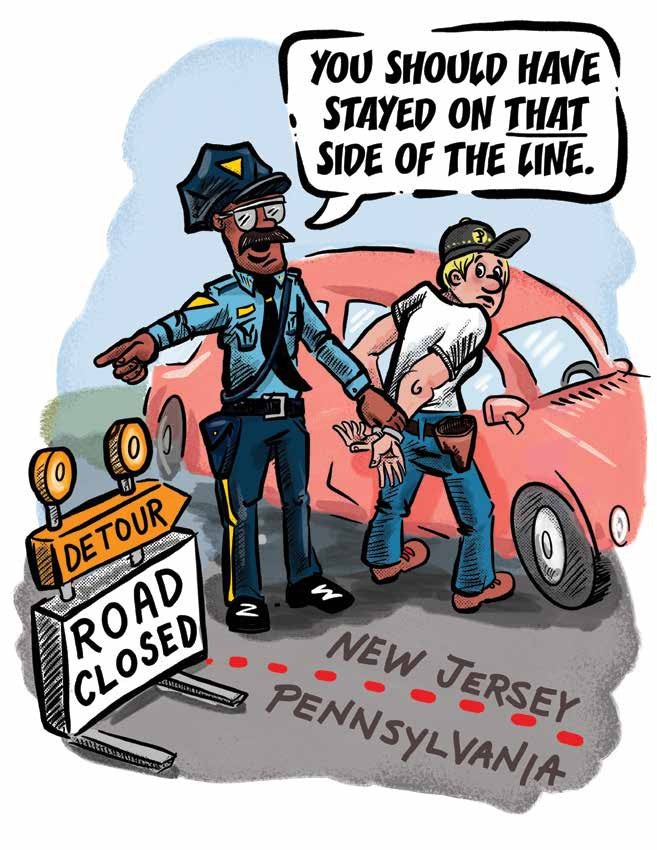STATE BY STATE
MAKING THE CASE FOR RECIPROCITY
JIM DOYLE
LEGALLY ARMED CITIZEN | IT’S JUST THE LAW | BALLISTIC BASICS RETURN FIRE CITY LIMITS

ILLUSTRATION BY: JASON BRAUN
Creating accidental felonies for the otherwise law-abiding does nothing to enforce order. However, individual state regulations on lawful carrying of concealed firearms create numerous opportunities for such lawful citizens to end up in legal trouble. While promising initiatives to establish national concealed carry reciprocity face an uphill battle, Second Amendment advocates are in an excellent position to advance reciprocity between individual states, which can build momentum for future initiatives. Let’s look at how to make a strong case for interstate reciprocity.
Law-abiding gun owners face an obstacle course of rules to purchase, possess, carry and use firearms. Owning a common item in one state might be a crime in the next state over.
This leads to a treacherous compliance path for concealed carry. Some states are exceptionally restrictive while others are exceptionally permissive, and many are somewhere in between. Even just finding the laws can be a challenge. One of the most useful tools in this area is brought to you by this very organization and can be found at USCCA.com/travel.
THE ACCIDENTAL CRIMINAL
Concealed carry reciprocity is a serious concern because Americans travel, and travel involves elevated risk of criminal encounters. As such, there are more reasons to carry while traveling — and that leads to a very real risk of accidentally becoming a criminal. All concealed carriers are responsible for compliance with the law wherever they are, but if a man or woman takes a wrong turn or misses an exit, it’s possible he or she will end up in a state he or she has no intention or desire to enter. Even intentional passage across a non-permissive state may require a traveler to stop, get out in a public place and handle a firearm in order to secure it, which poses its own risks.
This concern over inadvertent illegality is not an abstract phobia; many people have been arrested (particularly in New Jersey) for illegal concealed carry while holding valid outof-state permits. New Jersey police arrested Pennsylvania mother-of-two Shaneen Allen on an expressway, and after she lost her legal battle, Gov. Chris Christie ultimately pardoned her. In 2017, 59-year-old Donna Marie Gracey of Florida was arrested in Frenchtown, New Jersey, for carrying concealed and also for transporting hollow-point bullets. I myself have accidentally driven into New Jersey. It isn’t difficult to do.
SO WHAT CAN WE DO?
At first glance, this seems like a simple policy problem with a simple fix: If my Minnesota driver’s license is recognized in Virginia, and my Hawaii marriage license is recognized in North Carolina, shouldn’t my Texas License to Carry be recognized in California? The problem is that there is a longstanding precedent that individual states have the power to regulate concealed carry. District of Columbia v. Heller expressly acknowledged the constitutional legitimacy of prohibitions on concealed weapons. Even some gun-rights advocates are torn on this issue over the principles of federalism and state rights. But I would submit that there are ways we can achieve a national construct without violating state rights. A cluster of states with strong support for the Second Amendment could replicate the driver’s license compact: creating a data-sharing framework to ease reciprocity concerns and making it easier for more-hesitant states to sign on. Data sharing on us may rightly irk many gun-rights advocates, but it also disarms a critical (if unrealistic) argument from our opponents: A criminal in one state should not be able to lawfully carry in another state.
When we look at the political landscape, particularly in regards to gun-control policy, it can appear daunting to make any tangible impact on gun rights. Political parties spend a lot of time and money convincing us that one politician or another will either save or destroy the Second Amendment, but the reality is usually much more subtle. We may not have the momentum right now to achieve a national concealed carry construct, but what we can do is pressure individual state legislatures and state attorneys general to recognize concealed carry permits from more states. This is a line of effort where we are already making progress, and it can help us ultimately build national consensus.
ONE STEP AT A TIME
Every time a state loosens rules on lawful carry, our opponents cry “wolf” that there will be blood in the streets from all the gunfights. The alternate reality in which some of our opponents seem to reside sounds like a cheesy ‘80s action movie. We know that concealed carriers tend to be exceptionally upright and law-abiding when compared to other Americans. So when anti-gunners engage in hysterical predictions about this, capture their rhetoric and use it against them when experience proves them wrong.
As gun-rights advocates, we often find ourselves playing defense while reacting to headlines and gun-control blitzes. National concealed carry is an area ripe for us to turn the ratchet in our favor, but we have to pursue it delicately, starting at the bilateral, state-agreement level and working for a multi-state framework toward a national victory. And every step of the way, we must hold anti-gunners accountable for their ridiculous rhetoric about what these advances will mean for public safety.
Jim is a concerned citizen and gun rights advocate. His opinions are his alone and do not reflect the official position of his agency. References and links to other gun advocacy groups do not imply endorsement of those organizations. He can be reached at Jim@tacticaltangents.com.